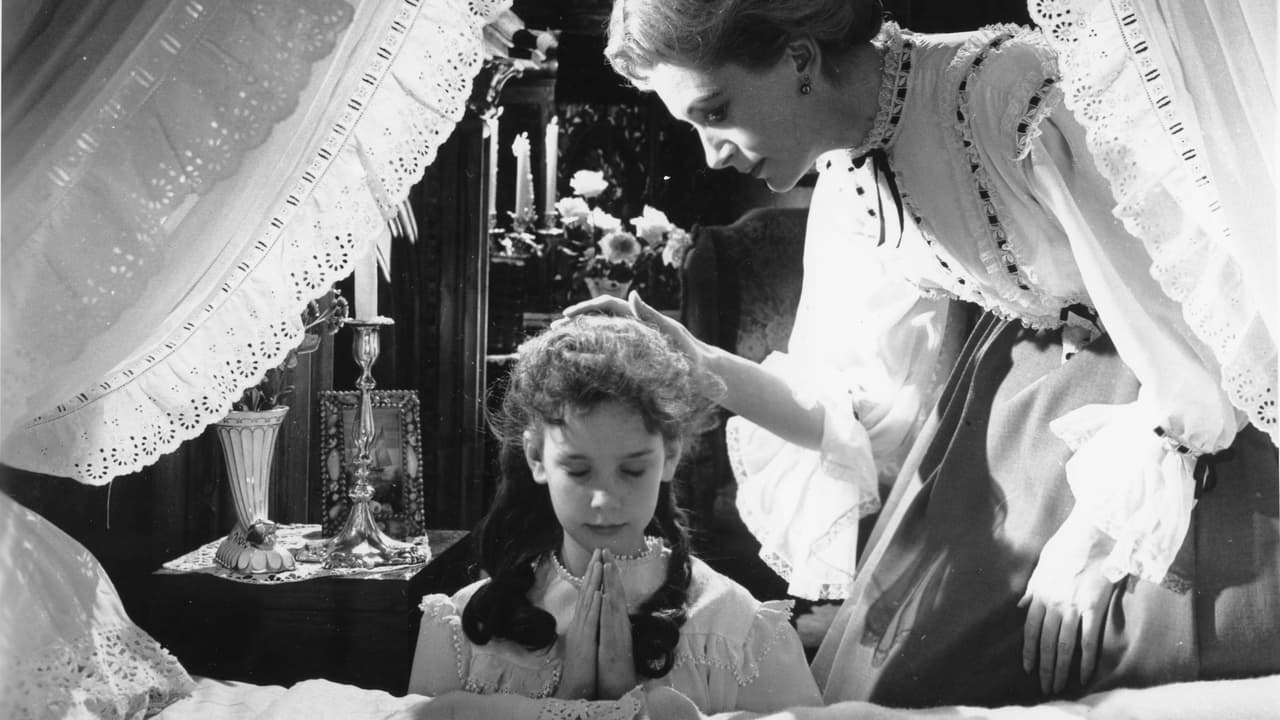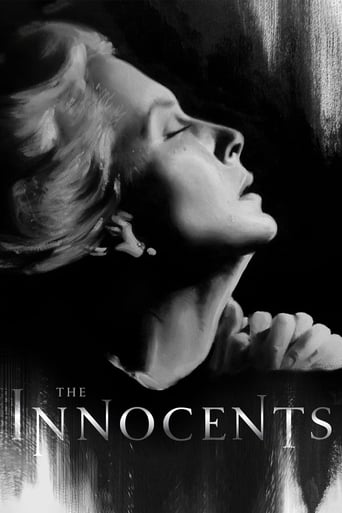

This movie was so-so. It had it's moments, but wasn't the greatest.
... View Morea film so unique, intoxicating and bizarre that it not only demands another viewing, but is also forgivable as a satirical comedy where the jokes eventually take the back seat.
... View MoreBy the time the dramatic fireworks start popping off, each one feels earned.
... View MoreThis is one of the best movies I’ve seen in a very long time. You have to go and see this on the big screen.
... View MoreInteresting horror movie although I wonder if the children were possessed by the ghosts previously living there whenever they were bad or secretive. I kind of don't understand why the boy died after the spirit left his body. Wouldn't he be his regular self again? I still recommend it and it had really cool shadows and light.
... View More..to modify Clint Eastwood's time honored line. A film adaptation of "The Turn of the Screw", this is the story of a governess, Miss Giddens (Deborah Kerr), hired to look after the orphaned niece and nephew of a wealthy man. He has had custody of them since infancy, and simply can't be bothered to be a parent to them. He thus gives Miss Giddens complete authority over the children and the household of the country estate where they live. Soon though, Miss Giddens realizes that there are ghosts in the house - two to be exact. The housekeeper tells her of Quint and Miss Giddens' predecessor, Miss Jessel, who had an indiscreet affair with Quint, also an employee in the household. Quint died, and Miss Jessel drowned herself in her grief. This film is in the same league as "The Haunting" in that you don't actually see that much. The suspense is in the music, cinematography, and atmosphere as a whole. There are a few reflections of the ghosts in windows and one very creepy scene by the lake, the one scene that has stayed with me since I saw this one as a child. Giddens' interest is in protecting the children, but she is a bit dithery, a touch unbalanced, and maybe not too bright. She makes up her mind that the ghosts are possessing the children,seems to be making up what she has to do to rid the children of the ghosts, and in fact she seems to be making up all of what has to be done as she goes along. She never stops to think what powers the ghosts might possess, and her decision to charge full speed ahead at exorcising them leads to a bad outcome, one in which she seems genuinely surprised.All of this I have just mentioned is why I truly think that The Innocents is Deborah Kerr's finest moment , she pulls off depicting this (at times) irritating and possibly daft and certainly hysterical and unhinged woman so well that I still liked her; and I was touched at the end by her pain instead of being angry with her for "causing" the bad outcome of the exorcism. It's a standard Kerr role, with touches of her various nuns, governesses and stuffy Brits from earlier films, so her seeming effortlessness in the part is an explainable plus, but in The Innocents she really reaches inside and pulls out something deeper to show us that her every moment is genuine.The children were absolutely perfect in their roles, which begs the question why was Pamela Frankin, who played the female child here, put in so many horror roles? Meg Jenkins plays it docile and down to earth as the housekeeper who befriends Giddens. You can tell she thinks the woman is daft, even though she has heard and seen things that make her believe that Quint and Miss Jessel are still "around" in some way. She tries to give Giddens some of her wisdom from a lifetime of taking care of children, but when her ideas are dismissed, in the end she just follows orders like the servant she's always been.
... View MoreBased on the 1898 novella "The Turn of the Screw" by Henry James, this is a superb psychological / supernatural horror film. I have not read the original story but I understand that it sticks quite closely to it. The film is imbued with a wonderful sense of tension caused not so much by the admittedly very effective and memorable visuals but by the ambiguity regarding the exact nature of the events being portrayed, specifically whether they have a natural or a supernatural origin. It has a first rate script by William Archibald, Truman Capote and John Mortimer and the excellent direction of Jack Clayton is certainly up to the task. Much of the credit for the film's atmosphere has to go to the beautiful black and white cinematography of Freddie Francis, a master of his craft and a great director in his own right. I was particularly impressed the use of deep focus on numerous occasions and the interaction of light and shadow throughout the film.The film stars Deborah Kerr, probably my favourite actress of her generation, in an utterly fantastic performance as the fascinating character Miss Giddens. In spite of the fact that she has no previous experience, she is hired to be the governess of the orphans Miles and Flora by their emotionally distant uncle, who would rather spend his time cavorting in London and elsewhere than raise his charges. Miss Giddens loves children and looks forward to bonding with Miles and Flora over the course of many years but almost as soon as she arrives at the luxurious country estate Bly, strange things start to happen. She hears voices and she sees figures that cannot possibly be there and which no one else seems to be able to see. The figures in question are a man and a woman which Miss Giddens believes to be the ghosts of her predecessor Miss Jessel and the uncle's valet Peter Quint. She learns from the housekeeper Mrs. Grose that the two of them were lovers and were not great believers in discretion since their behaviour left very little to the imagination of the other servants and possibly even Miles and Flora. After Quint's death, Miss Jessel fell into a deep depression and committed suicide. Since Miles followed Quint around like a puppy and Miss Jessel was a mother figure to Flora, Miss Giddens concludes that both their strange behaviour and her experiences are being caused by Quint and Jessel taking control of the children. However, Mrs. Grose is rather less convinced.One of the major reasons why I found the film so effective is that I could never make up my mind as to whether Miss Giddens was entirely correct about Bly being haunted by the ghosts of dead servants or whether she is insane. There is ample evidence to support both scenarios but whenever I thought that I had decided on one of them, something else happened to make me reconsider. For instance, in the film's most frightening scene, Miss Giddens sees Quint at the window and his cold, piercing eyes make quite an impression on her. However, she had discovered his photograph in the attic only minutes earlier so he was certainly on her mind. She thought that he was the man that she had seen on top of the tower earlier but his face was not clearly seen so her mind may have been filling in the blanks. On the other hand, the children are very, very odd and there are a few moments where I thought that the supernatural explanation was the more likely one. Miles in particular is a rather disturbing child who is far too mature for his age, complimenting Miss Giddens in a very flirtatious manner and even giving her an inappropriate kiss on the lips at one point. As Miss Giddens thought, he may be possessed by Quint's ghost. Then again, it may be because he spent so much time with Quint when he was alive and he is imitating his inappropriate behaviour since he has no idea how to act around women. Flora is the more normal of the two children, comparatively speaking, but there are numerous moments in which it seems likely that she is in contact with or even possessed by Jessel's ghost. While the film most certainly belongs to Deborah Kerr, it has a strong supporting cast. Martin Stephens, presumably cast based on the strength of his performance as David Zellaby in "Village of the Damned" (1960), is incredibly creepy as Miles and it is easy to see why Miss Giddens suggests that there is something otherworldly about him. Pamela Franklin manages to be both sweet and a little off-putting as Flora. Her innocent face may hide a mind that has been corrupted by either natural or supernatural forces. Peter Wyngarde does not have any dialogue but he makes an unforgettable impression as Quint in the aforementioned window scene. Megs Jenkins is excellent as Mrs. Grose, who becomes increasingly concerned about Miss Giddens' mental health as the film progresses and perhaps with good reason. Michael Redgrave has a great cameo as the uncle, who is mentioned throughout the film but only actually appears in the opening scene. I think that Mrs. Grose and the uncle are the only characters whose roles are entirely straightforward, incidentally.Overall, this is an engrossing, thought-provoking and incredibly clever horror film which I have not been able to stop thinking about since I watched it. The title was very well chosen as it is unclear who exactly it refers to, which is rather appropriate under the circumstances.
... View MoreThis is an example of what you can get when you put together a good story (the film is based on a novel from 1898 by Henry James), an actress who can play any part with perfection (Deborah Kerr) and a director of photography like Freddie Francis (also a filmmaker specialist in horror movies). "The innocents" is the best adaptation of Henry James (along with "The heiress –1948–, the excellent melodrama directed by William Wyler with Olivia de Havilland and Montgomery Clift) and one of the greatest (if not the greatest) horror films about haunting ever made. This atmospheric and unforgettable film is so deep and tense that is difficult find another title that can give us so much darkness and suspense (only some of the masterpieces by Alfred Hitchcock). Do yourself a favor and watch this movie!!!!!!!!!!!!!!!!!!!!!
... View More